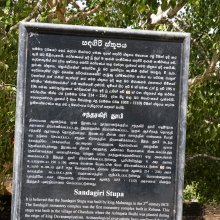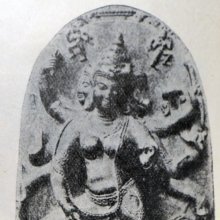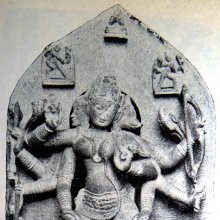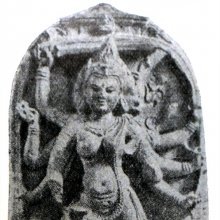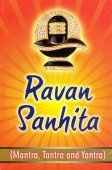Sharva, Śarva, Śarvā, Sarva, Sārva, Śārva, Sarvā: 30 definitions
Introduction:
Sharva means something in Hinduism, Sanskrit, Jainism, Prakrit, Marathi, Hindi, Tamil. If you want to know the exact meaning, history, etymology or English translation of this term then check out the descriptions on this page. Add your comment or reference to a book if you want to contribute to this summary article.
The Sanskrit terms Śarva and Śarvā and Śārva can be transliterated into English as Sarva or Sharva, using the IAST transliteration scheme (?).
Images (photo gallery)
In Hinduism
Shaivism (Shaiva philosophy)
Source: Wisdom Library: Śaivism1) Śarva (शर्व), one of the fifty Rudras according to the Caryāpāda section of the Makuṭāgama (one of the 28 Saiva Siddhanta Agamas).
2) Śarva (शर्व) refers to one of the “eight lords of divisions” (vigraheśvara) associated with the so-called eight divisions (vigraha) according to the Mataṅgapārameśvara (1.8.83–5). These “eight lords of divisions” are also mentioned in a copper-plate inscription found in Malhar, Chhattisgarh, written around 650 CE. The eight divisions (vigraha) represent the uppermost part of the Lākulas’ impure universe.
All these manifestations of Śiva (e.g., Śarva) appear at the borders of various divisions of the universe according to the Lākula system.
Source: Shodhganga: Iconographical representations of Śiva1) Śarva (शर्व) is the name of a deity who received the Kāraṇāgama from Kāraṇa through the mahānsambandha relation, according to the pratisaṃhitā theory of Āgama origin and relationship (sambandha). The kāraṇa-āgama, being part of the ten Śivabhedāgamas, refers to one of the twenty-eight Siddhāntāgamas: a classification of the Śaiva division of Śaivāgamas. The Śaivāgamas represent the wisdom that has come down from lord Śiva, received by Pārvatī and accepted by Viṣṇu.
Śarva obtained the Kāraṇāgama from Kāraṇa who in turn obtained it from Sadāśiva through parasambandha. Śarva in turn, transmitted it to Prajāpati who then, through divya-sambandha, transmitted it to the Devas who, through divyādivya-sambandha, transmitted it to the Ṛṣis who finally, through adivya-sambandha, revealed the Kāraṇāgama to human beings (Manuṣya). (also see Anantaśambhu’s commentary on the Siddhāntasārāvali of Trilocanaśivācārya)
2) Sarva (सर्व) or Sarvāgama refers to one of upāgamas (supplementary scriptures) of the Vātulāgama which is one of the twenty-eight Siddhāntāgama: a classification of the Śaiva division of Śaivāgamas. The Śaivāgamas represent the wisdom that has come down from lord Śiva, received by Pārvatī and accepted by Viṣṇu. The purpose of revealing upāgamas (e.g., Sarva Āgama) is to explain more elaborately than that of mūlāgamas (e.g., Vātula-āgama) and to include any new idea if not dealt in mūlāgamas.
Source: Brill: Śaivism and the Tantric TraditionsŚarva (शर्व) refers to the “supreme god”, according to the Vārāṇasīmāhātmya verse 1.116-125.—Accordingly, “Engaged in the path of the observance of the skull, the Lord wanders, free from attachment, displaying the Lokamārga and the supreme Lokātīta. And the lokas are designated ‘bound souls’, including gods, demons and men. No one realizes the supreme certainty with respect to knowledge of the self. And except for Śarva, the supreme god, there is no such behaviour of another [God]. No other god has certainty of knowledge. There is no such behaviour anywhere in the world with all its Gods. [...]”.
Source: SOAS University of London: Protective Rites in the Netra TantraSarva (सर्व) refers to “all (the world)”, according to the Netratantra of Kṣemarāja: a Śaiva text from the 9th century in which Śiva (Bhairava) teaches Pārvatī topics such as metaphysics, cosmology, and soteriology.—Accordingly, [verse 2.22cd-28ab]—“[...] That is supreme strength, that is supreme amṛt. The highest of splendors is highest light of light. The divine Lord is the supreme cause of all the world (sarva—sarvasya jagato). The creator, supporter, and destroyer are not as strong as this. This receptacle of mantras is the word of all perfections and characteristics [...]”.

Shaiva (शैव, śaiva) or Shaivism (śaivism) represents a tradition of Hinduism worshiping Shiva as the supreme being. Closely related to Shaktism, Shaiva literature includes a range of scriptures, including Tantras, while the root of this tradition may be traced back to the ancient Vedas.
Shilpashastra (iconography)
Source: Wisdom Library: Elements of Hindu IconograpyŚarva (शर्व):—One of the eight names of Rudra, given to him by Brahmā, according to the Pādma-purāṇa. This aspect became the presiding deity over the water. The corresponding name of the consort is Uṣā. His son is called Śukra.

Shilpashastra (शिल्पशास्त्र, śilpaśāstra) represents the ancient Indian science (shastra) of creative arts (shilpa) such as sculpture, iconography and painting. Closely related to Vastushastra (architecture), they often share the same literature.
Purana and Itihasa (epic history)
Source: archive.org: Puranic Encyclopedia1) Śarva (शर्व).—One of the eleven Rudras. (Bhāgavata, 6th Skandha).
2) Sarva (सर्व).—Another name of Śrī Kṛṣṇa. (Udyoga Parva, Chapter 70, Verse 12).
3) Sarvā (सर्वा).—A Purāṇic river. (Bhīṣma Parva, Chapter 89, Verse 36).
Source: archive.org: Shiva Purana - English TranslationŚarva (शर्व, “everything”) refers to an epithet of Śiva, according to the Śivapurāṇa 2.2.41.—Accordingly, as Viṣṇu and others eulogized Śiva:—“[...] obeisance to you, O lord, having the splendour of innumerable suns. Obeisance to you, the Bhava, the lord in the form of flavour and fluid. Obeisance to you who are every thing (Śarva), who are in the form of fragrant earth. Obeisance to Him of great splendour, Him in the form of fire”.
Source: Cologne Digital Sanskrit Dictionaries: The Purana Index1) Śarva (शर्व).—A name of Śiva Rudra;1 the presiding deity of the earth;2 represents the earth and hence the earth should not be made impure or unclean;3 the lord created by Brahmā in the 30th Kalpa who made aṭṭahāsa;4 the third son of Kṛṣṇalohita;5 his wife, Vikeśi and son Angāraka.6
- 1) Bhāgavata-purāṇa VI. 15. 28; Brahmāṇḍa-purāṇa II. 25. 23; Matsya-purāṇa 180. 19; Viṣṇu-purāṇa I. 8. 6; 15. 122; III. 2. 11; V. 34. 1.
- 2) Matsya-purāṇa 265. 40.
- 3) Brahmāṇḍa-purāṇa II. 10. 10.
- 4) Vāyu-purāṇa 22. 28.
- 5) Ib. 27. 28.
- 6) Brahmāṇḍa-purāṇa II. 10. 78; 13. 54.
2) Śarvā (शर्वा).—A name of Umā.*
- * Bhāgavata-purāṇa XII. 10. 35.
3a) Sarva (सर्व).—A son of Dhanuṣa.*
- * Matsya-purāṇa 50. 30.
3b) A son of Atri, the avatār of the 12th dvāpara.*
- * Vāyu-purāṇa 23. 157.
3c) A grandson of Svāyambhuva Manu; (but in 31. 18 putra is substituted for this name).*
- * Vāyu-purāṇa 33. 9.
3d) Sarvavit, Sarvātma, epithets of Viṣṇu ety.1 of.2
4) Sārva (सार्व).—A particular period of the day.*
- * Vāyu-purāṇa 66. 40.
Śarva (शर्व) is a name mentioned in the Mahābhārata (cf. I.60.2) and represents one of the many proper names used for people and places. Note: The Mahābhārata (mentioning Śarva) is a Sanskrit epic poem consisting of 100,000 ślokas (metrical verses) and is over 2000 years old.
Source: Shodhganga: The saurapurana - a critical studyŚarva (शर्व) is the deity to be worshipped in the month Śravaṇa for the Anaṅgatrayodaśī-Vrata, according to the 10th century Saurapurāṇa: one of the various Upapurāṇas depicting Śaivism.—Accordingly, the Anaṅgatrayodaśī-vrata is observed in honour of Śiva for acquiring virtue, great fortune, wealth and for destruction of sins [...] This vrata is to be performed for a year from Mārgaśīra.—In Śravaṇa the tooth-brush is pālāsa-wood, deity is Śarva, food is arkapatra and the result is the region of Śiva.

The Purana (पुराण, purāṇas) refers to Sanskrit literature preserving ancient India’s vast cultural history, including historical legends, religious ceremonies, various arts and sciences. The eighteen mahapuranas total over 400,000 shlokas (metrical couplets) and date to at least several centuries BCE.
Shaktism (Shakta philosophy)
Source: Wisdom Library: ŚāktismŚarva (शर्व) refers to one of the 53 gods to be worshipped and given pāyasa (rice boiled in milk) according to the Vāstuyāga rite in Śaktism (cf. Śāradātilaka-tantra III-V). The worship of these 53 gods happens after assigning them to one of the 64 compartment while constructing a Balimaṇḍapa. Vāstu is the name of a prodigious demon, who was killed by 53 gods (e.g., Śarva).

Shakta (शाक्त, śākta) or Shaktism (śāktism) represents a tradition of Hinduism where the Goddess (Devi) is revered and worshipped. Shakta literature includes a range of scriptures, including various Agamas and Tantras, although its roots may be traced back to the Vedas.
Pancaratra (worship of Nārāyaṇa)
Source: Shodhganga: Iconographical representations of Śiva (pancaratra)Sārva (सार्व) or Sārvasaṃhitā is the name of a Vaiṣṇava Āgama scripture, classified as a tāmasa type of the Muniprokta group of Pāñcarātra Āgamas. The vaiṣṇavāgamas represent one of the three classes of āgamas (traditionally communicated wisdom).—Texts of the Pāñcara Āgamas are divided in to two sects. It is believed that Lord Vāsudeva revealed the first group of texts which are called Divya and the next group is called Muniprokta which are further divided in to three viz. a. Sāttvika. b. Rājasa. c. Tāmasa (e.g., Sārva-saṃhitā).
Source: University of Vienna: Sudarśana's Worship at the Royal Court According to the AhirbudhnyasaṃhitāSarva (सर्व) refers to “(the attainment of) everything”, according to the Ahirbudhnyasaṃhitā, belonging to the Pāñcarātra tradition which deals with theology, rituals, iconography, narrative mythology and others.—Accordingly, “He who has the Yantra of Narasiṃha joined with [that] of Sudarśana constructed shall conquer even the other world. Just by drawing this, men can attain everything (sarva—sarvaṃ saṃpadyate nṛṇām)”.

Pancaratra (पाञ्चरात्र, pāñcarātra) represents a tradition of Hinduism where Narayana is revered and worshipped. Closeley related to Vaishnavism, the Pancaratra literature includes various Agamas and tantras incorporating many Vaishnava philosophies.
Vastushastra (architecture)
Source: Shodhganga: Elements of Art and Architecture in the Trtiyakhanda of the Visnudharmottarapurana (vastu)Śarva (शर्व) refers to one of the hundred types of Temples (in ancient Indian architecture), according to the Viṣṇudharmottarapurāṇa, an ancient Sanskrit text which (being encyclopedic in nature) deals with a variety of cultural topics such as arts, architecture, music, grammar and astronomy.—It is quite difficult to say about a definite number of varieties of Hindu temples but in the Viṣṇudharmottarapurāṇa hundred varieties of temples have been enumerated. For example, Śarva. These temples are classified according to the particular shape, amount of storeys and other common elements, such as the number of pavilions, doors and roofs. [...] The Viṣṇudharmottarapurāṇa relates that the temple named Śarva should be constructed in liṅga shape.

Vastushastra (वास्तुशास्त्र, vāstuśāstra) refers to the ancient Indian science (shastra) of architecture (vastu), dealing with topics such architecture, sculpture, town-building, fort building and various other constructions. Vastu also deals with the philosophy of the architectural relation with the cosmic universe.
In Jainism
General definition (in Jainism)
Source: archive.org: TrisastisalakapurusacaritraSarva (सर्व) refers to “everything” and represents one of the seven magic powers, according to chapter 4.7 [sanatkumāra-cakrin-caritra] of Hemacandra’s 11th century Triṣaṣṭiśalākāpuruṣacaritra: an ancient Sanskrit epic poem narrating the history and legends of sixty-three illustrious persons in Jainism.
Accordingly:—“[...] Magic powers were acquired by him enduring all the trials hard to endure, indifferent to any expedient for relief. The seven magic powers, namely: phlegm, vipruṣ, dried perspiration, impurity, excrement, touch, and also ‘everything’ (sarva), are called remedies”.
Source: The University of Sydney: A study of the Twelve ReflectionsSārva (सार्व) refers to “having all forms” and is used to describe the Self (Ātman), according to the 11th century Jñānārṇava, a treatise on Jain Yoga in roughly 2200 Sanskrit verses composed by Śubhacandra.—Accordingly, “This self itself is clearly a great ocean of excellent virtues. It is all-knowing, all-pervading, having all forms (sārva), supreme [and] pure”.
Synonyms: Niḥśeṣa.

Jainism is an Indian religion of Dharma whose doctrine revolves around harmlessness (ahimsa) towards every living being. The two major branches (Digambara and Svetambara) of Jainism stimulate self-control (or, shramana, ‘self-reliance’) and spiritual development through a path of peace for the soul to progess to the ultimate goal.
Languages of India and abroad
Marathi-English dictionary
Source: DDSA: The Molesworth Marathi and English Dictionarysarva (सर्व).—a (S) All, every part, the whole mass or quantity: also all, every one, the whole multitude or number: also all, the whole duration or extent. 2 Complete, entire, whole, perfect.
--- OR ---
sārva (सार्व).—a S Relating to the whole or all.
Source: DDSA: The Aryabhusan school dictionary, Marathi-Englishsarva (सर्व).—a All; every one; complete.
Marathi is an Indo-European language having over 70 million native speakers people in (predominantly) Maharashtra India. Marathi, like many other Indo-Aryan languages, evolved from early forms of Prakrit, which itself is a subset of Sanskrit, one of the most ancient languages of the world.
Sanskrit dictionary
Source: DDSA: The practical Sanskrit-English dictionaryŚarva (शर्व).—
1) Name of Śiva; कतिचिदवनिपालः शर्वरीः शर्वकल्पः पुरमविशदयोध्याम् (katicidavanipālaḥ śarvarīḥ śarvakalpaḥ puramaviśadayodhyām) R.11.93; Kumārasambhava 6.14.
2) Name of Viṣṇu.
Derivable forms: śarvaḥ (शर्वः).
--- OR ---
Śārva (शार्व).—a. Belonging or relating to Śiva.
--- OR ---
Sarva (सर्व).—Pron. a. [sṛtamanena viśvamiti sarvam Uṇādi-sūtra 1.151] (nom. pl. sarve m.)
1) All, every; उपर्युपरि पश्यन्तः सर्व एव दरिद्रति (uparyupari paśyantaḥ sarva eva daridrati) H.2.2; रिक्तः सर्वो भवति हि लघुः पूर्णता गौरवाय (riktaḥ sarvo bhavati hi laghuḥ pūrṇatā gauravāya) Me. 2.
2) Whole, entire, complete.
-rvaḥ 1 Name of Viṣṇu.
2) of Śiva.
-rvam Water.
--- OR ---
Sārva (सार्व).—a. (-rvī f.)
1) General, universal.
2) Fit or suitable for all; संभवन्ति यददोषदूषिते सार्व सर्वगुणसंपदस्त्वयि (saṃbhavanti yadadoṣadūṣite sārva sarvaguṇasaṃpadastvayi) Śiśupālavadha 14.4.
-rvaḥ A Buddhist or Jaina saint.
Source: Cologne Digital Sanskrit Dictionaries: Edgerton Buddhist Hybrid Sanskrit DictionarySarva (सर्व).—(Sanskrit), all; adv. forms, especially sarveṇa (noted by itself as adv. only in Mahāvastu i.90.6, all mss., Senart em. sarve te, wrongly), altogether; this is commonly emphasized by addition of a variety of other adv. forms in meaning ab- solutely altogether, in the most complete way: especially sarveṇa sarvam (= Pali sabbena sabbaṃ) Saddharmapuṇḍarīka 321.8; Lalitavistara 255.18; Mahāvyutpatti 6405; Mahāvastu ii.260.6, 7; 261.8; iii.223.6, 8; Divyāvadāna 39.1; 105.7; 270.11; 502.22; Śikṣāsamuccaya 349.11; (Ārya-)Mañjuśrīmūlakalpa 400.5; 561.17; Daśabhūmikasūtra 39.26; Bodhisattvabhūmi 324.1; in Mahāvastu i.126.8 probably read sarveṇa sarvaṃ (ed. with mss. sarva-)śūnyaṃ; sarveṇa sarvaṃ [Page583-b+ 71] sarvathā Saddharmapuṇḍarīka 77.7; Bodhisattvabhūmi 11.19; sarvathā sarvaṃ (= Pali sabbathā sabbaṃ) Mahāvyutpatti 6406 (follows 6405, above); sar- veṇa sarvaṃ sarvathā sarvaṃ Śikṣāsamuccaya 349.20; 350.7, 13; Laṅkāvatāra-sūtra 255.4; Suvarṇabhāsottamasūtra 169.1, 6; Aṣṭasāhasrikā-prajñāpāramitā 25.13 et al.; sarveṇa sarvaḥ (read sarvaṃ) sarvathā sarvaṃ sarvadā Śikṣāsamuccaya 9.13, see note p. 395, which cites Bcp. as reading in the same passage sarveṇa sarvaṃ sarvathā, only. See also sarvehi and sarvatratāye.
Source: Cologne Digital Sanskrit Dictionaries: Shabda-Sagara Sanskrit-English DictionaryŚarva (शर्व) or Śarvva.—m.
(-rvaḥ) Siva. E. śarv to injure, Unadi aff. ac; also sarva .
--- OR ---
Sarva (सर्व) or Sarvva.—mfn.
(-rvaḥ-rvā-rvaṃ) All, whole, complete, universal, entire. m.
(-rvaḥ) 1. Siva. 2. Vishnu. E. sṛ to go, to pervade, (the world,) van Unadi aff.; also according to some authorities preferable, sarbba as above.
--- OR ---
Sārva (सार्व) or Sārvva.—mfn.
(-rvaḥ-rvī-rvaṃ) Suitable to or fit for all, relating to all, &c. m.
(-rvaḥ) A Jaina deified sage. E. sarva all, (knowledge, &c.), aṇ aff.
Source: Cologne Digital Sanskrit Dictionaries: Benfey Sanskrit-English DictionaryŚarva (शर्व).—i. e. śṛ10 + va (cf. śaru), I. m. A name of Śiva, [Pañcatantra] ii. [distich] 169; [Harivaṃśa, (ed. Calc.)] 15408. Ii. f. śarvāṇī, Śiva’s wife.
--- OR ---
Śārva (शार्व).—i. e. śarva + a, adj. Belonging to Śiva, [Bhartṛhari, (ed. Bohlen.)] 2, 10.
--- OR ---
Sarva (सर्व).—probably sa + tra + va, I. adj., f. vā. 1. All, [Nala] 17, 50. 2. Every, [Meghadūta, (ed. Gildemeister.)] 20; 91. 3. Whole, entire, [Pañcatantra] 53, 24. Ii. m. Viṣṇu, Śiva.
— Cf. [Latin] soll-ennis, soll-ers, salvus, salus (= ved. sarva + tāti, ).
Source: Cologne Digital Sanskrit Dictionaries: Cappeller Sanskrit-English DictionaryŚarva (शर्व).—[masculine] [Name] of a god killing with arrows, in [later language] = Rudra-Śiva.
--- OR ---
Śārva (शार्व).—[feminine] ī relating to Śarva (Śiva); [with] diś [feminine] the north-east.
--- OR ---
Sarva (सर्व).—[adjective] whole, entire, all; [masculine] sgl. everyone, [plural] all ([with] api all together); [neuter] sgl. everything. — With a neg. not every, not every one or everything, no, nothing.
--- OR ---
Sārva (सार्व).—[adjective] useful to all.
Source: Cologne Digital Sanskrit Dictionaries: Aufrecht Catalogus CatalogorumŚarva (शर्व) as mentioned in Aufrecht’s Catalogus Catalogorum:—poet. [Sūktikarṇāmṛta by Śrīdharadāsa]
Source: Cologne Digital Sanskrit Dictionaries: Monier-Williams Sanskrit-English Dictionary1) Śarva (शर्व):—[from śara] a m. ([from] śaru) Name of a god who kills people with arrows (mentioned together with Bhava and other names of Rudra-Śiva)
2) [v.s. ...] Name of the god Śiva (often in the later language; [especially] in the form Kṣitimūrti; [dual number] Śarva and Śarvāṇī cf. [Vāmana’s Kāvyālaṃkāravṛtti v, 2, 21]), [Atharva-veda] etc. etc.
3) [v.s. ...] of one of the 11 Rudras, [Viṣṇu-purāṇa]
4) [v.s. ...] of Viṣṇu, [Monier-Williams’ Sanskrit-English Dictionary]
5) [v.s. ...] of a son of Dhanuṣa, [Viṣṇu-purāṇa]
6) [v.s. ...] of a poet, [Sadukti-karṇāmṛta]
7) [v.s. ...] [plural] Name of a people, [Mārkaṇḍeya-purāṇa] ([wrong reading] sarva)
8) Śarvā (शर्वा):—[from śarva > śara] f. Name of Umā, [Bhāgavata-purāṇa]
9) Śarva (शर्व):—b śarvaka etc. See p. 1057, col. 1
10) Śārva (शार्व):—mf(ī)n. ([from] śarva) relating or belonging or sacred to or derived from Śiva, [Kāvya literature; Kathāsaritsāgara] (with diś f. the east, [Varāha-mihira’s Bṛhat-saṃhitā])
11) Sarva (सर्व):—mf(ā)n. (perhaps connected with sāra q.v.; inflected as a pronoun except [nominative case] [accusative] sg. n. sarvam, and serving as a model for a series of pronominals cf. sarva-nāman) whole, entire, all, every (m. sg. ‘every one’; [plural] ‘all’; n. sg. ‘everything’; sometimes strengthened by viśva [which if alone in [Ṛg-veda] appears in the meaning ‘all’, ‘every’, ‘every one’] and nikhila; sarvepi, ‘all together’; sarvaḥ kopi, ‘every one so ever’; gavāṃ sarvam, ‘all that comes from cows’; sarva with a negation = ‘not any’, ‘no’, ‘none’ or ‘not every one’, ‘not everything’), [Ṛg-veda] etc. etc.
12) of all sorts, manifold, various, different, [Mahābhārata] etc.
13) (with another adjective or in [compound]; cf. below) altogether, wholly, completely, in all parts, everywhere, [Ṛg-veda; Chāndogya-upaniṣad] etc.
14) m. (declined like a [substantive]) Name of Śiva, [Mahābhārata]
15) of Kṛṣṇa, [Bhagavad-gītā]
16) of a Muni, [Catalogue(s)]
17) [plural] Name of a people, [Mārkaṇḍeya-purāṇa]
18) n. water, [Naighaṇṭuka, commented on by Yāska i, 12.]
19) cf. [Greek] ὅλος for ὁλϝος [Latin] salvus.
20) Sārva (सार्व):—mfn. ([from] sarva, of which it is also the Vṛddhi form in [compound]) relating to all, fit or good for all, [Śiśupāla-vadha xiv, 4] (cf. [Pāṇini 5-1, 10])
21) general, universal (See [compound])
22) m. a Buddha or a Jina, [cf. Lexicographers, esp. such as amarasiṃha, halāyudha, hemacandra, etc.]
Source: Cologne Digital Sanskrit Dictionaries: Yates Sanskrit-English Dictionary1) Śarva (शर्व):—śarvvati 1. a. To hurt.
2) (rvvaḥ) 1. m. Shiva.
3) Ṣarva (षर्व):—sarvati 1. a. To go; to injure.
4) Sarva (सर्व):—[(rvvaḥ-rvvā-rvvaṃ) a.] All, whole, entire. m. Shiva; Vishnu.
5) Sārva (सार्व):—(rvvaḥ) 1. m. A Jaina. a. Fit for or relating to all.
Source: DDSA: Paia-sadda-mahannavo; a comprehensive Prakrit Hindi dictionary (S)Sarva (सर्व) in the Sanskrit language is related to the Prakrit word: Savva.
[Sanskrit to German]
Sanskrit, also spelled संस्कृतम् (saṃskṛtam), is an ancient language of India commonly seen as the grandmother of the Indo-European language family (even English!). Closely allied with Prakrit and Pali, Sanskrit is more exhaustive in both grammar and terms and has the most extensive collection of literature in the world, greatly surpassing its sister-languages Greek and Latin.
Hindi dictionary
Source: DDSA: A practical Hindi-English dictionarySarva (सर्व) [Also spelled sarv]:—(a) all; whole, entire, complete; ~[kāmya] universally popular; coveted/desired by all; ~[kāla] for or at all times, always; ~[kālīna] belonging to all times, perpetual; ~[kṣamā] amnesty; ~[gati] omnipresent; ~[jana] everybody; all; ~[janīna] universal; applying to or concerned with all and sundry; ~[jita] all-conquering; ~[jña] a know-all, omniscient; ~[jñatā] omniscience; ~[darśī] all-seeing; ~[dalīya] all-party consisting of representatives of all parties; ~[dāna] gift of one’s all; ~[deśīya] cosmopolitan, universal; [deśīyatā] cosmopolitanism; universality; ~[nāma] a pronoun; ~[nāśa] holocaust, complete ruin, utter destruction/devastation; •[honā] to go to the devil; ~[nāśī] all-destroying, causing complete ruin; ~[niyaṃtā] all-controlling, Master of all; ~[pālaka] all-preserving, all-protecting; ~[priya] all-loving; loved by all, universally popular; hence ~[priyatā] (nf); ~[bhakṣī] omnivorous, all consuming; ~[maṃgala] good of all, universal good; ~[rāṣṭravāda] cosmopolitanism; ~[vida] omniscient; ~[vyāpaka] omnipresent; universal; ~[vyāpakatā] omnipresence; universality; ~[vyāpī] omnipresent; universal; ~[śaktimāna] omnipotent; ~[śubhavāda] optimism; ~[śubhavādī] an optimist; optimistic; ~[śrī] Messrs; ~[śreṣṭha] the best, best of the lot, pick of the basket; hence ~[śreṣṭhatā] (nf); ~[sammata] unanimous; ~[sammati] unanimity; •[se svīkṛta honā, prastāva ādi] to be adopted/passed unanimously; ~[saha] all enduring; ~[sādhāraṇa] the common man; people at large; ~[sāmānya] common, commonplace; ~[sulabha] easily accessible to all; ~[hara] appropriating everything, all-usurping; ~[hārī] all appropriating; all-usurping; ~[hita] general welfare, common good.
...
Kannada-English dictionary
Source: Alar: Kannada-English corpusŚarva (ಶರ್ವ):—
1) [noun] Śiva.
2) [noun] Viṣṇu.
3) [noun] name of one of the twenty eight Śaiva scriptures.
4) [noun] (pros.) the symbol for a long syllabic instant (-).
--- OR ---
Sarva (ಸರ್ವ):—[noun] (correctly, ಶರ್ವ [sharva]) Śiva.
--- OR ---
Sarva (ಸರ್ವ):—
1) [adjective] all; entire; whole.
2) [adjective] ಸರ್ವರು [sarvaru] sarvaru all persons.
--- OR ---
Sārva (ಸಾರ್ವ):—[adjective] = ಸಾರ್ವತ್ರಿಕ [sarvatrika]1.
Kannada is a Dravidian language (as opposed to the Indo-European language family) mainly spoken in the southwestern region of India.
See also (Relevant definitions)
Starts with (+14): Sarvarikara, Sharvacala, Sharvadasa, Sharvadatta, Sharvadish, Sharvaka, Sharvakosha, Sharvaksha, Sharvala, Sharvalaykiray, Sharvali, Sharvan, Sharvanaga, Sharvani, Sharvaniramana, Sharvaparvata, Sharvaparvatavasini, Sharvapatni, Sharvara, Sharvari.
Ends with: Bhavasharva.
Full-text (+2626): Sharvavarmika, Sarvajanika, Sarvakala, Sharvani, Sarvajanina, Sarvasutra, Sarvavibhaktika, Sarvavarnika, Sarvakamasamriddha, Sarvagunika, Sarvadhikarin, Sarvamsaha, Sarvapatha, Sarvalaukika, Sarvashraya, Sarvasiddhartha, Sarvaduhkhakshaya, Sarvarthasiddha, Sharvaksha, Sarvadarshin.
Relevant text
Search found 221 books and stories containing Sharva, Śarva, Śarvā, Sarva, Sārva, Śārva, Sarvā, Ṣarva; (plurals include: Sharvas, Śarvas, Śarvās, Sarvas, Sārvas, Śārvas, Sarvās, Ṣarvas). You can also click to the full overview containing English textual excerpts. Below are direct links for the most relevant articles:
Rudra-Shiva concept (Study) (by Maumita Bhattacharjee)
2.3. Rudra as Śarva < [Chapter 6a - The Epithets of Rudra-Śiva]
2. Vājasaneyi-saṃhitā (c): Oblations to different names of Rudra < [Chapter 2 - Rudra-Śiva in the Saṃhitā Literature]
4. Forms of Śiva and his different activities < [Chapter 5 - Rudra-Śiva in the Purāṇic Literature]
Shrimad Bhagavad-gita (by Narayana Gosvami)
Verse 11.40 < [Chapter 11 - Viśvarūpa-darśana-yoga (beholding the Lord’s Universal Form)]
Verse 8.28 < [Chapter 8 - Tāraka-brahma-yoga (the Yoga of Absolute Deliverance)]
Verse 9.4 < [Chapter 9 - Rāja-guhya-yoga (Yoga through the most Confidential Knowledge)]
Garga Samhita (English) (by Danavir Goswami)
Verse 6.9.6 < [Chapter 9 - The Arrival of Śrī Dvārakā]
Verse 6.6.42 < [Chapter 6 - The Yādavas’ Victory When Śrī Rukmiṇī is Kidnapped]
Verse 5.1.26 < [Chapter 1 - Advice to Kaṃsa]
The Practice Manual of Noble Tārā Kurukullā (by Dharmachakra Translation Committee)
Chapter 4 < [Appendix - Sanskrit Text]
Chapter 3 < [Appendix - Sanskrit Text]
Chapter 2 < [Appendix - Sanskrit Text]
Chandogya Upanishad (english Translation) (by Swami Lokeswarananda)
Rig Veda (translation and commentary) (by H. H. Wilson)
Related products

